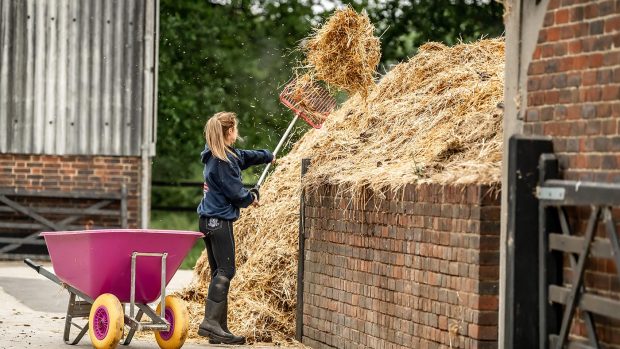Mucking out is a necessary evil where animals are concerned, and you certainly don’t want to have to pay good money for the pleasure of doing it. After the Department for the Environment, Food and Rural Affairs issued the new waste management regulations at the end of March, it looked like horse owners and businesses would have to shell out for their manure heaps. DEFRA clarified today that this is not the case, unless they plan to compost it with other materials.
The new Waste Management Regulations 2005, which come into force on 1 July 2005, reduce the number of activities that are subject to licensing, but also introduce a charge for exemptions. Among the activities that now need to pay for a waste licence exemption is community composting. This sparked fears that muck heaps would require a composting exemption.
DEFRA has now moved to quell the rumours, explaining in a statement that anyone who stores manure where it is produced needs neither a waste management licence nor a licence exemption, with the proviso that manure is intended solely as horse and bedding waste.
“As long as the heap is simply manure, they don’t need to get a licence or an exemption. If you add other waste material to it, then you do,” said a spokesman.
The British Horse Society, which had raised concerns when the waste licensing Regulations was first announced, welcomed DEFRA’s statement. “We are pleased that DEFRA has now provided clarification on the implications of the regulations.
“The key points appear to be that the new regulations apply only to businesses, not individual horse owners; the storage of waste pending collection will not entail a charge; but collecting and storing waste for the purpose of producing compost may attract a charge,” said BHS’s Chief Executive Graham Cory.
“It appears — and we are checking this with Defra — that there must be an intention to turn the waste, by appropriate management, into compost for commercial purposes. Simply stacking up waste in a way that will inevitably lead to biodegrading, i.e. composting, will not amount to composting for the purposes of the Regulations.”
DEFRA confirmed that the new regulations apply to establishments — from businesses and companies to charities or clubs, but not private individuals — which are mixing manure with other materials to make compost. “Adding other waste products to manure to treat it or to make compost may require registration of an exemption from the need for a waste management licence or a waste management licence because this activity is classified as composting,” they said in a statement.
The charge levied when registering a composting exemption, which ranges from £252 to £482 for the first year, goes towards recovering the regulation costs “to ensure that such treatment is carried out in an environmentally sound manner.” People who register for an exemption will also need to carry out the composting on an impermeable pavement with sealed drainage to help safeguard the environment.
DEFRA also pointed out that undertakings which are spreading manure to land still need to get a waste licence, as required by the Waste Management Licensing Regulations 1994. However, this may soon change.
“DEFRA and the [Environment] Agency believe that the land spreading of manure may in future be eligible for an exemption from waste management licensing which would be a less onerous form of regulations than a licence,” they wrote in a statement. “DEFRA will consider this issue further with representatives of the horse industry as part of a forthcoming review of waste management licensing exemptions.”




